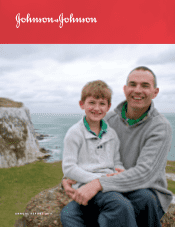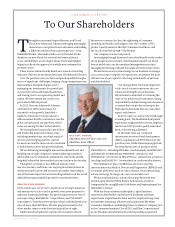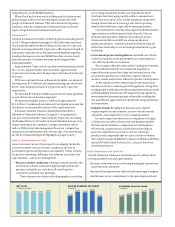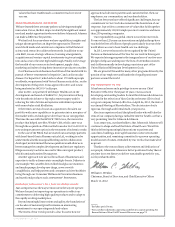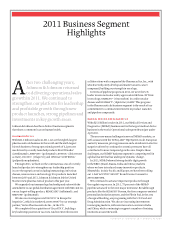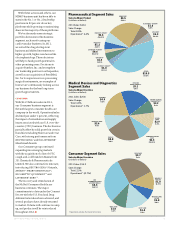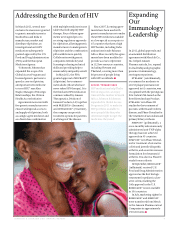Johnson and Johnson 2011 Annual Report Download - page 8
Download and view the complete annual report
Please find page 8 of the 2011 Johnson and Johnson annual report below. You can navigate through the pages in the report by either clicking on the pages listed below, or by using the keyword search tool below to find specific information within the annual report.
JOHNSON & JOHNSON 2011 ANNUAL REPORT6
PHARMACEUTICALS
Accelerating Cancer R&D
One example is ZYTIGA® (abiraterone
acetate), an oral, once-daily medication
for use in combination with prednisone
for the treatment of men with metastatic
castration-resistant prostate cancer
(CRPC) who have received prior
chemotherapy containing docetaxel.
The U.S. Food and Drug Administration
granted marketing approval for ZYTIGA®
in April 2011 after an expedited
six-month review. An accelerated
regulatory review process granted by
the European Medicines Agency led to
marketing authorization by the European
Commission in September 2011.
How this transformative prostate
cancer treatment came to market
exemplifies a fundamental shift in the
approach to research and development
that is being applied across Janssen
Research & Development.
TRANSFORMING PROSTATE CANCER
TREATMENT
Globally, prostate cancer is the second
most frequently diagnosed cancer in men
and the fifth most common cancer overall.
According to estimates by the National
Cancer Institute, more than 240,000 new
cases of prostate cancer were diagnosed in
the U.S. in 2011, while nearly 34,000 men
died from the disease.
Androgen hormones, such as
testosterone, are known to fuel prostate
cancer tumors, and despite chemical or
surgical reduction of hormones, some
cancers continue to rely on them. Before
the approval of ZYTIGA®, treatment
options to extend life for men with
this kind of metastatic castration-
resistant prostate cancer were limited to
chemotherapy. When this was no longer
effective, patients were out of treatment
options.
Abiraterone acetate was discovered
by Imperial Cancer Research at Royal
Marsden Hospital in London. It was
licensed to Cougar Biotechnology, Inc.,
which began testing the compound in men
with CRPC who were taking androgen
deprivation therapy.
“This breakthrough research hinged
on scientific understanding of the tumor
micro-environment—specifically, the idea
that the tumor itself could be the source
of the remaining testosterone,” says
compound leader for abiraterone acetate
Michael L. Meyers, M.D., Ph.D., Janssen
Research & Development, LLC.
“By identifying the key science for
these patients and the fact that this drug
was already being developed, the way
to accelerate the process was to try to
collaborate or acquire the drug,” says Hait,
who recognized the value of abiraterone
acetate and championed the acquisition
of Cougar Biotechnology. “The fact that
it worked so well shortened the timeline
between the start of the Phase III trial and
registration of the drug.”
Johnson & Johnson acquired Cougar
Biotechnology in July 2009. Based on
positive results from a completed Phase III
study, marketing applications were filed
with regulatory authorities in the U.S.,
Europe and other countries in 2010. The
entire development program proceeded
very rapidly: It was less than six years from
the time the first patient was treated to
marketing approvals in the U.S., Canada,
the European Union and Switzerland.
A NEW APPROACH TO CANCER R&D
A noted oncologist before joining
Johnson & Johnson in March 2007, Hait
has been a catalyst for change, bringing
focus and helping to centralize R&D within
therapeutic areas. Within oncology, Hait
created Tumor Strategy Groups (TSG)
focused on three areas of high unmet
need: hematological malignancies, lung
cancer and prostate cancer. TSGs further
specialize by using the tumor micro-
environment as the strategic research focus.
“The tumor is no longer viewed as a
tumor cell living in isolation. A tumor cell
is very close to its environment, and it’s
using its environment to grow better,”
says Hait.
That kind of insight enabled the
paradigm-changing scientific progress
that led to ZYTIGA®, validating the TSG
approach.
Importantly, Hait also helped open
minds to look beyond the company’s own
labs and invest in science, wherever that
science may be.
“Drug development is very competitive
and difficult,” says Hait. “One way to be at
the cutting edge is not to be walled inside
your own brick and mortar. You have to
be out there to see the most exciting new
things that are developing.”
Collaborations are one way of being out
there, and they promise to fuel advances
in oncology research and development.
For example, an ongoing agreement with
the David H. Koch Institute for Integrative
For Bill Hait, the most compelling science is that
which holds the greatest promise for developing
medicines that address high unmet needs.
“A network that allows you to have insights into
what is going on in the world of science is essential,”
says Hait, M.D., Ph.D., Global Head, Janssen Research &
Development, LLC. “It takes an understanding of both
the medical need and the most compelling science to
get meaningful innovations to patients quickly.”

